#hes denounced so many problematic creators
Explore tagged Tumblr posts
Text
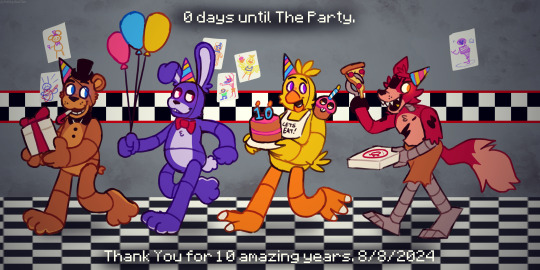
it's more than an understatement to say how much these games have impacted me, should I have been 7 and playing them? no, but my journey through art, life and basically everything has been carried by these goofy robots.
HAPPY 10 YEARS FNAF!
#art#digital art#fanart#artists on tumblr#fnaf#fnaf anniversary#happy 10 year anniversary#five nights at freddy's#fnaf 10 year anniversary#fnaf fanart#I know what Scott has done in the past but I really want to look at people beyond the surface#hes worked with so many diverse creators#hes denounced so many problematic creators#and i like to think hes a good guy#cried drawing this#listening to fnaf music all day to celebrate
34 notes
·
View notes
Text
Goddd why is the internet so tiring sometimes like it's a poll about CATS!!! Why the fuck are you trying to push your weird anti-minecraft cringe culture beliefs on it and even more just parroting whatever the fuck you've heard from twitter in order to paint all minecraft youtubers as "problematic" just because there was some problematic people in the genre like hello???
There's assholes in every demographic yet somehow because this one cat is owned by a creator who makes content for a genre you don't like, he MUST be problematic and therefore his CAT too
It's genuinely upsetting and honestly such fun polls gets sullied by shitty people who just hate anyone who dares touch one of the most popular video games in the past decade because of a couple of bad eggs in the community. They don't even have to have interacted with these bad eggs, they just have to have just so happen to make videos about the same video game as them.
Scar BARELY has anything to do with most problematic content creators and yet he and his deceased cat still gets dragged by people who find minecraft cringe and hide it under the guise of thinking any and every minecraft youtuber is simply problematic therefore it's okay to harass them and their fans and spread hatred towards their pets ackshully.
He is legitimately one of the most wholesome minecraft creators in the platform that had constantly inspired many disabled people because of his positivity and his frankness about his experiences with both his physical and mental disabilities and experiences with the medical industry, both positive and negative. All of this doesn't matter though because he plays minecraft so he must be someone who agrees with problematic minecraft youtuber man #34 so he's definitely problematic even if I don't know anything about him. And his cat, Jellie, regardless of how you feel about Scar himself or if he is worth redeeming just because he plays minecraft with his friends, gets thrown under the bus for simply being the pet of this creator because she's just some rando cat of a minecraft youtuber so of course I should also hate her. Oh she died? Well sucks to suck because she's still some youtuber's cat. How problematic of her.
This also happened in other polls like the one from a few months ago with Jimmy being shitted on by outsiders from the fandom to the point that the person who was running the poll had to remove him because of the harassment that they were receiving. This is despite the fact that Jimmy is genuinely one of the most inoffensive minecraft youtubers out there who actively scolds his friends for even making light innuendos whenever they play. "Being bad at video games isn't being doomed by the narrative" says the fans of TTRPG youtube series which is based on game strategy and random chance and has some similarities with sandbox games. And of course, he's also problematic because he plays minecraft. Nevermind you don't actually known anything about him, his character, or the story that people are referring to. He plays minecraft therefore he is problematic.
It happened with other polls like the trans swag poll where people were so giddy to misgender REAL LIFE trans people (not just the characters they played) just because these other fans' FICTIONAL blorbos were up against them in the polls. They would assume any and all people who had ever created minecraft content are cis simply just because of, again, some bad actors that they had or had not associated with in the past. It doesn't matter if they had not spoken about or even actively denounced this bad actor either, they played with that person once upon a time so therefore misgendering them isn't transphobic guys I swear! They're just cringe problematic cis people they couldn't possibly be trans! and if they are they're the bad kind of trans so it's totally cool to misgender them!
I'm not even asking people to like minecraft youtubers or change their minds about perpetuating this new kind of cringe culture but just questioning what is it that makes the term "minecraft youtuber" make these people just assume the worst, and, even further, resort to VILE comments and behavior that border on outright bigotry? Why is it that seeing "minecraft youtubers" make these people think that harassment and hatred sent to the fans and even just the poll makers is justified regardless of the actual stance of the person that had brought them up? Why do these people think that it's appropriate or even funny to make jokes about dead pets or to jokingly misgender trans people just because they're associated with the term "minecraft youtuber"?
I don't know
This won't be rebloggable
I'm tired
3 notes
·
View notes
Note
hey can you give an explanation for why you dont like dream anymore? im kinda on the fence about him rn so im just curious
aside from any bullshit he’s done, he’s just.. mediocre. he’s virtually indistinguishable from a lot of other minecraft youtubers. nothing about his content makes him different other than the fact it’s made by him. he blew up so quickly, and his content would be fun surface level stuff to watch, but all the background knowledge on him just makes it impossible, because you can replace any of his videos with a video from Minecraft Youtuber #19483829 who isnt nearly as problematic and have the same experience. he’s just some white guy.
for any like, political/morality/discourse bullshit whatever you wanna call it: if i dont think id like a content creator in person, i undoubtedly wont like their content, regardless of how “political” it is. dream seems like a moderate on the political scale, even with him denouncing his past conservative beliefs. many of his fans may be able to move on from that, but unless he succeeded in becoming the best ally humanly possible, i dont think i could. he speaks out on too little, and the stuff he DOES speak on doesnt give me a good image of his political beliefs at all. claiming his fanbase isnt anti-black when he himself is a white man with no authority on the matter, disrespecting veterans as a whole when he has as much privilege as he does, his propensity to disrespect people publicly, when they have not even a fraction of his audience, knowing how absolutely batshit his audience is. i really just cant move past it. obviously no one’s perfect, but when you keep messing up in the same fashion, with only halfhearted apologies and frantic explanations that feel more like him just wanting to get out of trouble rather than him learning anything, you start to see a pattern.
he’s irresponsible with his platform, and if i could live without seeing one more tweet of his, or another smiletwt mf i would live a happy life.


also i just fucking hate these. i rlly just hate these LOL i hate them a lot
i dont think dream is the world’s shittiest person or whatever. he just doesnt think before he acts or says some shit, and that tells me a lot more about his character than any minecraft stream or “love you guys ❤️❤️❤️” tweet will.
#asks#idk like#i only casually enjoyed his content very early into my time in the mcyt fandom#and then grew to be Very annoyed with him#and now i just cant stand the mf#what little respect i had for him was lost with the ma/natreed shit#though when i think abt it i dont even know if i had any respect left for him at that point#when i realized i couldnt stand him it made me realize i couldnt stand a lot of the mcyt crowd and so i just left#the dsmp story was iffy anyways and i dont need it to survive so i just stopped hyperfixating lmao fuck them blocks
24 notes
·
View notes
Text
Hazbin Hotel and VivziePop Drama
I've been hearing/seeing a lot of drama concerning Hazbin Hotel and it's creator VivziePop, and while I don't know her personally or really care what people think, I do hate slander and the spread of misinformation. Truly nothing in this world upsets me more than when people believe rumours while making no effort to fact check, and that's exactly what's happening right now. That said, I wanted to try and clear up some of the rumours going around about Vivzie and the show, because I think some of them are absolutely outrageous and need to be addressed.
1. Vivzie hired an abuser onto the show.
Now, I’m not here to burn anyone at the stake, especially since I don’t know anything about Chris Niosi (the alleged abuser), who I believe openly admitted to the allegations? Regardless, this is a moot point. He’s not credited anywhere at the end of the episode. So either he was booted before production wrapped up or he had nothing to do with the show in the first place.
2. Vivzie supports bestiality.
Admittedly I thought this one might be true, since she draws so many anthropomorphic animals. In the very least, I figured she was probably a furry, but I haven't seen any evidence supporting this accusation either. Near as I can tell, this rumour started for two reasons. One, because of her famous Zoophobia comic, which revolves around a therapist named Cameron who gets assigned to work with human-like animals. Ironically, poor Cameron suffers from crippling zoophobia, which makes for some pretty decent comedy. I didn't read the whole comic because, quite frankly, it’s not my cup of tea and I just don’t have the time. But from what I saw there are no examples of bestiality anywhere in its contents.
Two, this message, which blew up all over social media:

To me, this just proves that people are more interested in virtue signalling than checking to see if their claims are actually true. Everything about this message is 100% false, which I’ll touch on in my next point.
3. Vivzie is a pedophile and she’s drawn child porn.
This is hands down the worst allegation and holy shit, I really wish people would stop using it to defame someone when they don't have any proof. This is a life-ruining accusation and you're disgusting if you believe it based solely on hearsay. This rumour began to spread when Vivzie allegedly shipped the two underage characters in the above photo and drew them NSFW-style. At the time, one character was 19 while the other was 14, and the relationship was a very illegal student-teacher relationship.
This is WRONG! The characters were not 14 and 19, they were actually 18 and 19, the legal age of consent! Additionally, the relationship wasn't student-teacher. One character is a student and the other is Alumni (a student teacher). This one pisses me off the most because it’s obvious the person who sent that message didn’t even bother to conduct any research. They said, “He’s a teacher, she’s a child.” Both characters are MALE!
Since then, Vivzie has apologised for any NSFW art she drew in the past and stated that it's not a reflection of her art today, and I'm inclined to believe her. Almost every artist has drawn NSFW content at some point in their career, and hers wasn't even distasteful. Other than this one example, there is no evidence anywhere that suggests she’s drawn “child porn”. In fact, she’s never even drawn explicit NSFW.
Please stop spreading this rumour. It’s dangerous and completely incorrect.
4. Vivzie said the "N" word!
No, she didn’t. It was a fabricated tweet. That is all.
5. Vivzie is copyright striking every video that criticises her!
No she isn't. YouTube’s DMCA is automatically striking people who are using full clips without permission. Vivzie has gone public several times, telling people exactly how to avoid getting a copy strike from the algorithm, which is something she absolutely does not have to do. At this point, she doesn't owe you anything. In my opinion, she should just sit back and watch these channels burn.
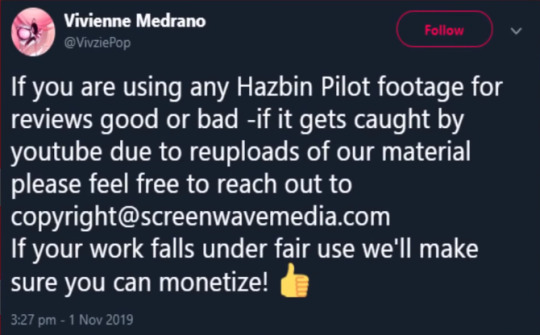
6. Vivzie copies and traces other artists’ work.
This is another one I’ve seen going around, but I looked into it as thoroughly as I could and failed to find any concrete evidence to support the allegations. As of right now, there are only two examples of Vivzie “copying” or “tracing” other artists’ work, and both of them can be explained. The first is a gif she made with a character from her Zoophobia comic, which looked a lot like the girl from ME!ME!ME!:
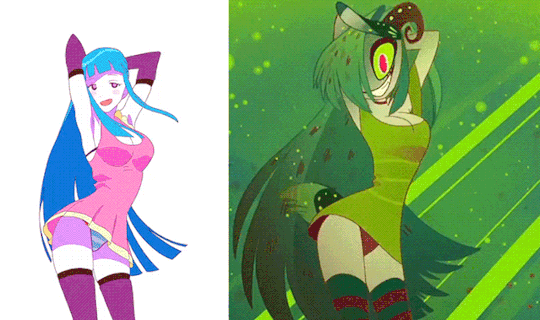
Damn, that’s pretty incriminating. She obviously stole-- oh, wait. This gif was part of a ME!ME!ME! MEP (multi editor’s project) and Vivzie didn’t take full credit, despite the fact that it’s not even a direct trace. It’s supposed to look like the original, which she fully cited. The second example comes from a short dance sequence from her Timber video, which seems to have been inspired by several Disney movies. As Vivzie herself stated, that was an homage to the original animations. Lots of artists and shows do this, including the beloved Stephen Universe series.
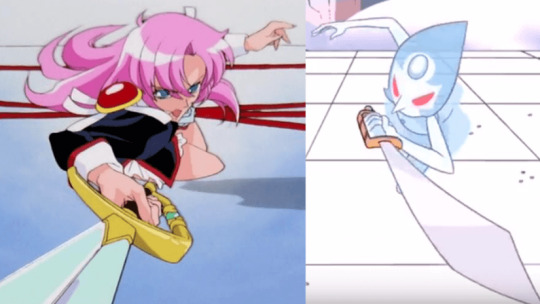
Regardless, this doesn’t count as stealing character designs or plagiarising someone’s work. It’s meant to be respectful, an admiration of other projects. Other than these two instances, however, there is no evidence of her tracing or stealing other people’s art. From what I’ve discovered, all other designs she’s been accused of “stealing” are characters she bought and paid for. They’re quite literally HER characters.
7. Vivzie supports problematic creators.
I’m getting really tired of guilt by association. Vivzie follows and enjoys some controversial figures, but who cares? We can argue all day about whether or not the accusations against them are true, but it ultimately has nothing to do with the show or Vivzie as a person. I do the exact same thing, to be honest-- follow and listen to people on all sides so I can learn, understand, and form my own opinions. The fact that some people think this is bad, to me, is absolutely mesmerising. Vivzie doesn’t control what the people she follows post, and if they do something overly questionable she publicly criticises and denounces it.
From Vivzie:
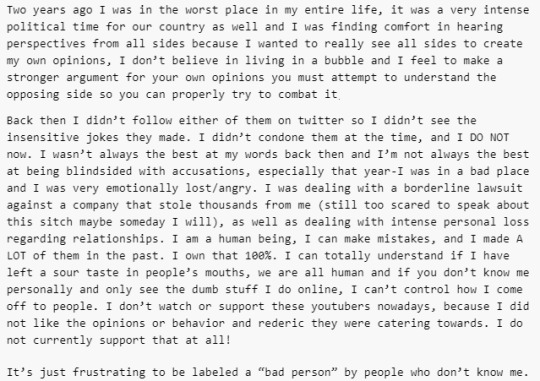
Now that that’s been dealt with, I’d like to address some complaints/claims about the actual show.
8. Vaggie is an angry Latina stereotype and a lesbian stereotype. Vivzie is appropriating Hispanic culture and misrepresenting the gay for profit.
First off, I see a lot of people passing around yet more misinformation regarding Vivzie's race. So many people seem to think she's white? Well, I'm here to tell you they're wrong. Very incorrect. Vivzie is in fact Latina, and Vaggie is meant to mirror some of her own personality traits.
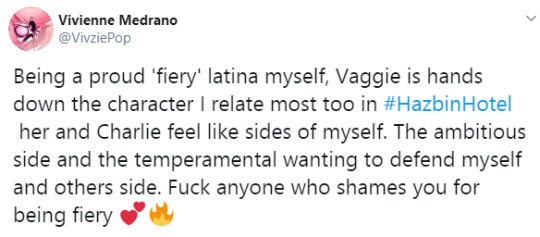
Second, who is Vaggie mad at? Context matters, and if we take a look at the episode, we see that Vaggie is literally only mad at two specific people: Angel Dust and Alastor. Why? Well, for starters, it's her girlfriend's dream to run a rehab hotel for sinners, and Angel Dust nearly demolishes that dream single-handedly. Vaggie has every right to be over-the-top vitriolic. Then there's Alastor, a known sadist, narcissist, and murderer who loves trapping people in his nefarious schemes. He invites himself in, effectively takes over the hotel, and pushes both her and Charlie aside. At one point he even sexually assaults her by slapping her butt during his musical number. So yeah, I think her seething ire is totally justified. Keep in mind, however, that when she's around Charlie she's calm, collected, and happy. I wouldn't call that a stereotype.
Thirdly, the lesbian stereotypes. I keep hearing this argument but I really don't see it. Both Vaggie and Charlie have so much personality and trust for each other. Maybe I'm wrong, but the stereotype I know always totes a more butch, tomboyish woman with a ditsy, innocent, naive woman. Charlie is optimistic, but she isn't stupid. She refuses to shake Alastor’s hand because she knows he’s likely trying to screw her over. She’s also not entirely innocent herself and uses words like “fuck” and “shit”. I also wouldn’t call Vaggie butch or tomboyish. She has a cute, girly presentation, complete with a pink ribbon in her hair, lace stockings, and a dress. She's protective of her girlfriend, as I think we all are with our partners, and there's nothing wrong with that. They're flawed characters, as every character is meant to be. This isn't a problem.
9. The show is racist, sexist, homophobic, transphobic, blah, blah, blah.
I’m amazed this is even an argument. The show is supposed to be a dark comedy that takes place in HELL. You know, the place the worst of the worst end up after they die? What were you expecting? Everyone gets a shot or two fired at them, but that doesn't make them bad characters nor does it make the show itself horrible. Take, for example, Katie Killjoy, the news reporter so many people are up in arms about. She says she doesn’t “touch the gays” because she has “standards”. Well, here’s a newsflash of my own: we’re not supposed to like her! She’s an antagonist. Not to mention ten seconds later Charlie insults her and isn’t the least bit slighted by her pretentious attitude. The characters are strong and don’t take shit from anyone, because to some degree they’re all terrible people who can throw down when it’s called for.
Obviously if you don’t like the show or think it’s offensive, I’m probably not going to change your mind. That’s perfectly fine. You’re entitled to your opinions and you don’t have to watch the show. Just stop lying and stop trying to take it away from everybody else. Stop attacking Vivzie and spreading misinformation without checking the facts. I realise a lot of people probably aren’t trying to be vindictive and only want to do something good, but just remember this: the road to hell is paved with good intentions.
#hazbin hotel#vivziepop#vivzie#alastor#angel dust#vaggie#charlie#timber#stephen universe#drama#radio demon
14K notes
·
View notes
Note
You have absolutely great takes so I wanted to know your opinion about the entire way Sunrise dealt with the execution of the sequel, because something doesnt exactly make sense to me - it's either Sunrise were hilariously disconnected from reality or they just didnt care; WHY would they even make an entire sequel dedicated to one problematic ship that isnt even liked by the majority of the fandom (SessRin) , while basically shitting all over the most popular one (Inukag) ? What did they think would happen? xD Why would their sequel EVER be accepted with no issues with decisions like that?
I'm glad you think so well of my takes, querent! I don't personally think they're particularly insightful, but that's probably because they're native to my head, and might be obvious to me, but not anyone else.
On why Sunrise could have thought HNY as it came out was any kind of a good idea, the way I see it, there are a couple of possibilities. The first is just plain incompetence. We know that the lead writer of the show has a... bias toward these relationships, to put it nicely, and that he and his allies in the company have been trying to cultivate the audience's sensibilities in that direction for many years as well. They could genuinely have thought they had succeeded in convincing all of us to support the ship, leading to a bungle.
The second possibility, however, is that the show was calculated to be unpalatable or cause an uproar. That might SEEM counterintuitive from this side of the problem, because we as fans tend to think our tastes need to be catered to, or at least soothed, in order for our viewership to be secured. I myself thought at the beginning of this debacle that Sunrise would have to tiptoe around the issue to maintain as much of the audience as possible. Why would anyone accept an addition that twisted and ruined their favorite media?
But with more and more outright insulting remakes/sequels coming out that seem to miss the point entirely or even make a mockery of elements of stories beloved by fans, I'm starting to think it's all done on purpose. Sunrise is one thing, but DISNEY does this a lot, and never seems to flinch at the backlash. You'd think by now these companies would figure out what they've been doing wrong and fix it, but that's only if they've been doing things WRONG by their measurements.
Research has been coming out recently that suggests we engage more with content on social media that pisses us off than the stuff we actually like. Incendiary posts spread like wildfire and produce arguments miles long because denouncing things that are distasteful and offensive to us has become the core of internet existence. This is especially exacerbated regarding content to do with identity and affirmations of such: race, creed, sex, orientation, political affiliation, and yes, fandom.
We engage with fiction that really appeals to us on the level of identity, because the whole reason we get into it in the first place is we see something in it that we identify with. Something deeply personal stands out to us in it, intended by the creator or not, and we adopt it as a part of us and a reflection of who we are. We buy merchandise and consume new content as a way to reaffirm our affinity for the aspects of the media we have internalized. We OWN it; it is OURS.
So it feels personal whenever someone says something disparaging toward our favorite media. It feels even MORE personal when an official source of content contradicts the source material and the way things were understood by ourselves and our community, or presents an immoral twisted picture of it. We rage against anything that hurts the image of the source material because it's also OUR image, and we have to defend it as part of ourselves. Out comes the disavowal, the vocal rejections, the attempts to shame and withdraw support from the company. And this of course bumps up engagement and the numbers for the content and studio.
Online, attention is currency, and getting the most attention often means raising a LOT of ire and tempers over hot-button issues. It's just good business sense to troll away and make people angry these days.
As conspiratorial as it might seem, I think there's a good chance HNY was written for the algorithm rather than to actually appeal to an audience. Considering how Sunrise has yet to actually give development and definition to the controversial pairing in question, and their affiliate manga artist characterized the show as one of many possible futures, they're not really endearing themselves to the shippers anymore either. That might change in the second season, if they're willing to risk their distribution deals and such, but if not, I'd say universal frustration might have been the goal.
Whatever gets the outrage points, I guess.
40 notes
·
View notes
Text
Is Rob Thomas Jealous of Taylor Sheridan’s Success?

Remember when Taylor Sheridan was nominated for an Oscar for ‘Hell Or High Water’? Although Rob Thomas did congratulate him for his nomination, some people detected some sarcastic undertone within his tweet. Don’t know whether they are friends in real life or not, but many suspected that RT was a bit envious that TS was nominated for Best Writing.
Before he was famous as a great screenwriter who also wrote the acclaimed ‘Sicario’ franchise, he appeared as a recurring character Danny Boyd in VMars. You may remember Danny Boyd; one of the cousins of the Fitzpatrick and specifically Liam’s right-hand man. He also played the great Sheriff/Deputy Chief Hale from Sons of Anarchy. After many stints as recurring characters in many shows, he started to write a screenplay. Sicario is a film about Cartel hitmen and Narcos. Very well written and made, and it made him a household name.

This is why fans took notice when Rob started to inserted many Narcos-style storylines about a cartel hitman in Neptune (season 4 VMars). The plot was weak and seemed out of place from the whole VMars vibe. Rob wanted to put every ingredient that made Cartel drama, Noir, Comedy, and Romance into this one miniseries, he forgot about the characters and what made it good in the first place. He wanted to be taken as a “serious” writer so much, he forgot that he was using an existing show with a different vibe and insisted that the show was matured. He wanted the show to be Breaking Bad, Better Call Saul, Sons of Anarchy, Sicario... but he ended up using all the tropes into this blender and the result is a mess. It’s like making ice cream but then he decided to add some onions just to spice things up.
Rob is well known to ‘borrow’ many plots and storylines from his favorite movies into his shows. He claims that it’s more of a homage. But when every episode of his shows is some kind of homage of something, it bears a question of whether he could write an original story or not.
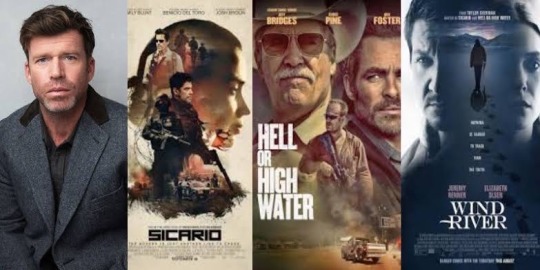
Taylor Sheridan’s Sicario was less about the hitmen plot but more about the characters. Many shows like Breaking Bad, Better Call Saul, and many more are about the characters and how much they are written brilliantly. Fans love the shows not just because of the plots (although they are good), but because of the characters. Fans care about them and want to see more of them. The plots are there to accompany them, not the other way around.
Rob thinks to get taken seriously is to have all those plots into one giant bowl. He forgot about the characters; therefore he forgot what made the show brilliant. He forgot (or ignore) why the show was great; it was all about the characters. And the fact that he is also jealous (based on his tweets back then) about his fellow creators, kinda cemented the idea that he is stuck in an old school writing that he is accustomed to and not liking the idea that other writers from his generation are more successful and more acclaimed than him.
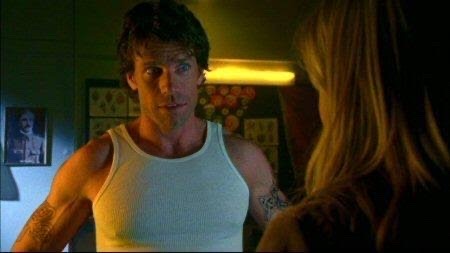
What he said about Taylor Sheridan made people frown. He said, “Hey remember this guy who played this loser Danny Boyd?” (Paraphrasing, of course) and then he posted an unflattering picture of the character. “I made him!” I think many fans pointed out on Twitter that he was only joking, but could feel the jealousy seeping through the tweet.
When Jessica Chastain was nominated for an Oscar, he also tweeted, “I am assuming Jessica Chastain will thank me profusely in her acceptance speech tonight. Veronica Mars made her career!” Fans of Chastain (who didn’t know who he was and thought that he was the singer of Matchbox 20) immediately roasted him on Twitter, calling him out, and got angry because this man claiming that her success was because of him. He immediately said that he was only joking and that he was proud of her, that an Oscar nominee used to be on his show.

But this has become a pattern, that when someone he knew suddenly become successful, he would joke that they should thank him. Fans were surprised that he never said anything about Tessa Thompson’s success and soaring career when he was on Twitter, but glad that he didn’t. The only actors that always praising Tessa Thompson are Percy Daggs III, Erica Gimpel, Francis Capra, Jason Dohring, and Kyle Gallner. Fans never heard Rob Thomas said anything about her, but maybe that was a good thing. Tessa Thompson mentioned that she had a bad experience on the set of VMars because of the way they treated her character and the fact that they straightened her curly hair so it wouldn't look “ghetto”, and the fact that Rob wrote her character as a punching bag.

Back to Taylor Sheridan, the man is now known as a successful writer-director who directed “Wind River”, a movie about the rape and murder of a Native American girl on tribal lands, and is meant to provoke conversation about the exploitation experienced by indigenous women. When the movie was bought by The Weinstein Company, Taylor Sheridan threatened to destroy the movie after Harvey Weinstein's scandals. “I said, if my movie’s going to die, I’ll be the one to kill it,” Sheridan said in an interview. “I will take my name off it, and publicly denounce it. I would have said, don’t go see this movie, don’t rent it, don’t watch it. If he was going to remain publicly attached if he was going to benefit from a film highlighting the atrocity he perpetrated? No.” He also demanded that the proceeds from the movie would be given to charity and women’s organizations.
He was ready to nuke his own movie before letting it live on with Weinstein branding. Some of us always pondered... Whether Rob would even do the same thing (denounce his movie, giving the film money to charity, etc)? Judging by his own scandalous iZombie tv show when Robert Knepper guest-starred in the show it seems he wouldn't nor care. He never publicly comment about Robert Knepper and his rape allegations. The only people who commented were the actors like Rahul Kohli, Malcolm Goodwin, Robert Buckley, and Rose McIver. Maybe the people (Rob and Diane) who write rape in every show as plot devices but not as raising awareness are not really feminists as they claimed to be.

Taylor Sheridan might not be the next great screenwriter; occasionally his works are problematic. He is this manly Marlboro man writer who writes about men even when he writes about feminist stuff. His female characters sometimes are white and pretty with the tendency of damsel in distress or white saviors. But at least he is trying to hone his skill to be a better writer. We will see more about his future in interest. In conclusion, Taylor Sheridan, the glorified extra from Veronica Mars probably deserves those recognitions. Rob Thomas can steam.
21 notes
·
View notes
Text
“Fix it” Shakarian Mass Effect Sequel concept
Hundreds (thousands? Considering Asari) of years go by after the end of ME3. Things settle down into normality. People settle down into their now new existence, cut off from the rest of the galaxy. Eventually they forget how to be homesick. People become happy. Shepard goes from being a hero to being a pietist.
Then something goes wrong. Something threatens what is now the known galaxy once again. The galaxy, settled and peaceful, is struck by the sudden threat and unprepared in their almost utopia. But they fight back, and they manage to stand their ground.
However things are not going well. The known galaxy simply does not know how to handle this threat. And although they’ve managed to dig in their heels, the leaders are doubtful as to how long they can last before this threat starts pushing hard and they all get trampled. This goes on for years, each side inching back and forth against each other.
During this time, a radical idea is suggested. Although outlawed for hundreds if not almost a 1000 years by this stage, it is suggested that what the Known galaxy needs is its savior once again, and the proposal is made to clone Commander Shepard so that she may lead them against this new threat, as someone who has not only seen and defeated the reapers, a much greater threat, but as someone who by now has an almost religious connotation to her. The idea is denied.
However, not long after, a heavy blow is struck by the threat against the known galaxy. The leaders find themselves facing total destruction as a very real possibility. In desperation, the cloning idea is reconsidered, and eventually approved.
(This is getting very long so more under the cut)
The cloning process does not take long. Despite the illegal nature of genetic engineering, the loophole that is Omni-gel had been refined again and again over the centuries, and the simple structure of the medical gel helps smooth over the next step of proper genetic engineering. off the record, a few unscrupulous scientists are enlisted as well, who have had more hands on experience with genetics. As for Shepard, things were a bit trickier. Having been lost during the last stand, it takes time before someone is contact by the being known as “The Shadow Broker”. The Broker offers the leaders a small box, supposedly made by Dr Tsoni, a scientist and comrade of Commander Shepard. It seems she had foreseen a possibility as this, and had stored a small sample of DNA from Commander Shepard before she was killed. The sample is old and despite preservation efforts, deteriorated in some parts. But after a brilliant suggestion to patch up the missing DNA code with the DNA sample from the Lazarus Project by the agency known as Cerberus from around the same time, a working DNA code is compiled, and not long after, an adult clone of Shepard is grown.
Reportedly the first thing the clone asks upon awakening is “Did it work?”
The Shepard Clone is a perfect copy of the former commander as far as genetics go. However, accurate accounts of her personality are hard to come by. And hero worship had all but stripped her of her humanity in cultural memory. The idea of Shepard being a mortal human with opinions and emotions comes as a difficult reality to the leaders. Nevertheless, she is filled in on the current threat and brought up to speed. Due to her genetic heritage, she is treated somewhere between a tool and a religious icon, neither of which she seems to like. But she recognises the threat, and despite misgivings about her current existence, agrees something needs to be done.
She jokingly states “That’s the second time I’ve died and had to come back. Third time I’m gonna demand a free coffee.”
The rest of the “Game” takes place after this as Shepard travels across the known galaxy, trying to piece together a plan against the threat which has already taken deep root n the Known Galaxy. After encountering some scientists and theorists and the usual group of kooks and weirdoes for teammates, an idea is formed to somehow reunite the Galaxy as one once more. An impossible task considering the destruction of the Mass Effect Relays during the Reaper War. However, Shepard mentions meeting the creators of the Reapers once, and considers they might have the knowledge needed to construct something similar to the relays. The only problem is, how to contact them again?
The story ensues, meetings are made with new friends and new enemies, the peaceful and borderline utopian society ends up being more of a setback than a boon as Shepard discovers, with the Galaxy residence not only being unequiped and inexperienced when facing this threat, but also hostile towards the very concept of the threat existing, and anyone that challenges their world view as they’ve come to enjoy it, including those people directly trying to save them from it.
On top of this, Shepards status as a clone is problematic for many higher-ups, and fractures start to appear in the Known Galaxy’s group of leaders. on TOP of this, Shepards near religious status also becomes problematic, as two groups slowly start to form around her return. The first being religious zealots, eager to owrship her as a reincarnated diety, and the OTHER is a group of religious zealots denouncing her as a false prophet who will doom them all.
Both have “security” forces. which become problematic.
One thing the leaders and scientists did not account for when creating Shepard was her strong emotional bonds to her former team-mates. Not only is her emotional scars from losing friends during the Reaper War still strong, but now its expounded upon by her loss of her friends who survived the war but are now long dead. She starts becoming prone to moodiness and brooding.
It is at this point that the scientists she recruited early on, the same scientist who suggested the Reuniting the galaxy idea and who worked on Shepards cloning project, suggests privately to Shepard that perhaps, due to the unique situation, he might make a suggestion. He mentions Tsoni’s box, saying that although the box did contain Shepard’s DNA and Tsoni’s obvious foresight that it might be needed some day, there were also personal affects in the box, seemingly addressed to Shepard herself. On top of this, there were also instructions to any geneticists planning to do what they did in cloning Shepard. He says it was not in his department, but he feels that, logically, if Shepard’s emotional state is compromised it might affect her resolve, which in turns hurts the Galaxy’s chances of survival. And he feels perhaps Tsoni’s message may help. (this dude is obviously a Salarian. Or whatever it is Salarians have become by now)
a mission is launched to retrieve the box, off the record as it is currently in custody by the Galactic leaders. However, Shepard has friends on the inside, and they help her and some squadmates slip in to retrieve it from the facilities.
They retrieve the box, and upon reading its contents, both addressed to her and to the geneticists, Shepard makes a shocking discovery; Liara it seems, was a VERY good Shadow Broker. But an even better friend. When she compiled the box for future generations should they ever need it, she had been approached by Garrus who pretty much kicked her door down and demanded she take a DNA sample from him and include it too. It seems there had been an argument that lasted several days of back and forth messaging and Garrus periodically showing up to shout at her. Eventually, Garrus managed to win her over to the idea, although Liara does not disclose what he eventually said that convinced her. The instructions to the geneticists tell them it is imperative to Shepard’s success in whatever it is they need her for that the turian sample also be cloned. She states they can ignore this advice if they want, but doing so would greatly diminish Shepard’s ability to fight their battles for them, and ignoring Liara is a good way to doom them all. After some searching Shepard and her squad locate a different facility where the second cloning process would have taken place.
Shepard is obviously angered that this has been kept from her. She is furious that Liara’s instructions were ignored, she is furious that Liara is no longer with her to support her, and she is furious at the thought that Liara’s instructions may have been ignored completely and there would be nothing to find.
However, again her scientist by-now-friend recommends giving it a shot. As he’s mostly concerned with surviving all this and figures any unorthodox means to keep him and the rest of the galaxy alive is perfectly ok no matter how weird it may sound. (this guy was also obviously one of the more unscrupulous scientists hired to work on the Shepard Clone project)
Another mission where Shepard and crew infiltrate the second facility. The mission is tense and Shepard is emotional compared to her usual steely resolve (although as usual only her friends would really notice the difference). However, it seems that the geneticists did follow Liara’s instructions, and Shepard finds Garrus locked up in the facility, patiently waiting for her. He apparently had no worries that if he waiting long enough she’d eventually show up guns blazing to come find him. It’s a difficult reunion, being in the middle of a mission, but Shepard and squad manage to smuggle Garrus out and onboard Shepard’s ship.
A more personal and emotional reunion happens in private.
The Garrus that joins Shepard is a Garrus that lived past the Reaper War. It’s a Garrus that is familiar, but a little sadder. But at the same time, whatever extra sadness he carries, seems to fuel his devotion and happiness just to be near Shepard again. It’s an intensity in affection, but being completely alone in this future galaxy, its the companionship Shepard needs. Together, the two of them manage to heal both their wounds by being together. Shepard’s wounds of existentialism and her questionable humanity, and Garrus as a grieving lover in a peaceful world where everyone else was happy and content but him.
Garrus is also helpful in filling in gaps in Shepard’s memories she suffers due to the DNA gaps filled with her Lazarus DNA, which was before the end of ME3. Garrus does not like talking about it very much, but he talks anyway.
At some point during the adventure Shepard asks Garrus what he said to convince Liara. He shrugs and jokes “That you’d never make it without me around.” he then softens and corrects himself. “Actually, what I really told her was that there is no Shepard without Vakarian. And after the whole reaper mess… it was clear to me there was no Vakarian without Shepard either. Not really.”
The “game” goes on. Shepard gets in trouble with the galactic leaders for breaking rules like she always does. She fights religious zealots. She patches up diplomacies that have broken over time. She breaks physics to try and find the creators of the Reapers and THEN by building a new Relay.
The religious zealots on both sides eventually join forces somehow. Possibly those seeing Shepard as a false prophet have decided she IS a diety, but one of destruction, and the religious zealots who already believe she is a diety agreeing. They need to be dealt with AS WELL as the outside threat.
After many battles, missions, recruitment, close calls, diplomacy missions, digging up the past, questioning Utopia vs Imperfect survival, What it means to be “human” etc etc we find out the “outside threat” is, in fact, coming from within the Galaxy. It is not an outside threat at all, but a part of the fracture galaxy that has become war-like, and eager to absorb and “unite” the rest of the galaxy under it. Much like Shepard is trying to do… but the “evil” way.
big fights, big missions blah blah blah and eventually, in the end, Shepard and her team are victorious.
This time however, she survives and Garrus survives and they live to see the Galaxy reuniting, slowly, as they construct new relays.
At the very end, Shepard tells Garrus she feels guilty. She wonders if Shepard 1 resents her for surviving this time. That it may be better if she had died during this mission too, and that perhaps it was the fate of every Shepard to come, save, and then die. And if she has somehow broken the very idea of “Shepard” by daring to still be there after the end.
Garrus comments that he remembers being Garrus 1, unlike her. And Garrus 1 was pissed off that he didn’t get to survive with Shepard beside him. He also comments that “Garrus 1 is probably sitting at the bar and yelling down “Shut up and live happily ever after already!” over his drink.” and that he’s pretty sure Shepard 1 is sitting right beside him,
The end.
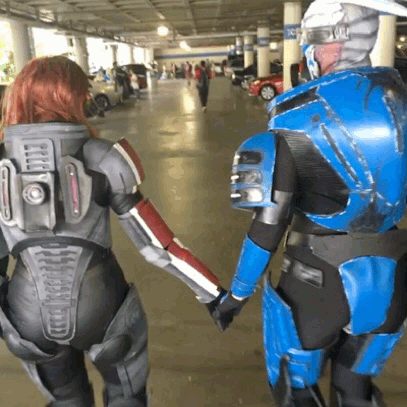
(P.S. hire me, Bioware.)
#Mass Effect#Garrus#Shepard#Shakarian#Garrus Vakarian#Femshep#Fanfic concept#Fanfic#Mass Effect 4#Or maybe Mass Effect 4 - 6#Sure why not#Let's make this a trilogy#I more proud of this than I should be#Also I've now made myself VERY ANGRY that this game doesn't exist#DAMMIT!!!!!
65 notes
·
View notes
Text
What is Headcanon?
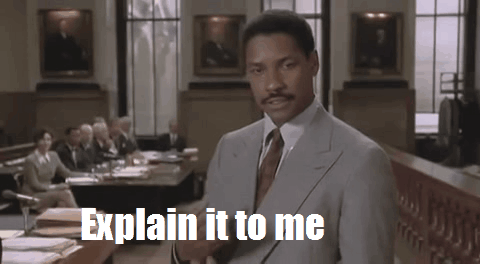
I’ve been putting off this post, but everything that happened recently, I think it’s actually time.
For those who are new to fandom in general or for those that simply don’t know what the term means, this post is going to explain Headcanons and the role that they play in fandom communities.
There are actually several varying definitions of headcanon, but as you’ll realize, they basically all revolve around the same concept.
So, where does the term even come from?
knowyourmeme : “The term dates back to Ronald Knox’s 1911 essay “Studies in the Literature of Sherlock Holmes” to distinguish Holmes stories written by Sir Arthur Conan Doyle from those penned by fans of the character. The term “headcanon” has been used to describe fan-given traits since as early as July 2007, when a LiveJournal fanfiction author used the term to describe her interpretation of the mother of Gwen from the animated sci-fi franchise Ben 10.”

What does it actually mean?
Urban Dictionary Top Two Definitions:
headcanon : An idea, belief, or aspect of a story that is not mentioned in the media itself, but is accepted by either the media consumer themselves or the fandom in general. If it is confirmed by the creator of the story, it becomes canon. (this is important ... I’ll use this later)
headcanon : Used by followers of various media of entertainment, such as television shows, movies, books, etc. to note a particular belief which has not been used in the universe of whatever program or story they follow, but seems to make sense to that particular individual, and as such is adopted as a sort of "personal canon". Headcanon may be upgraded to canon if it is incorporated into the program or story's universe.
Fanlore
Headcanon (or head canon, head-canon) is a fan's personal, idiosyncratic interpretation of canon, such as the backstory of a character, or the nature of relationships between characters.
This can be affected both by professional tranformative works, such as art, movies and audiobooks, and by fanworks such as fanart, fanfiction, cosplay, manips, vids and podfic.
Headcanon may represent a teasing out of subtext present in the canon, or it may directly contradict canon. If other fans share this interpretation, it may become fanon.
TVTropes
Headcanon is what is Canon in the minds of each fan. Headcanon is when a fan takes the elements imposed by canon and shapes it to his/her particular liking.
In short, Headcanon is canon that lives in the head of a fan. Though it can be contrary to canon, it actually doesn’t have to be. Most of the time, it is used by fandom content creators to ‘fill in the gaps’ about the fictional world’s mythology, timeline, and continuity.
Why the lesson? What is this really about?
Fandom, Superfans, and Something Else Entirely
Mostly, this is just a reminder to people that fandom is supposed to be fun and inclusive. The entire point of fandom is the communal aspect of it. Its purpose is NOT to take ownership of characters or properties or to shun other fans for their headcanons.
The moment that it becomes more about ‘the object of the fandom’ and less about ‘interacting with the other fans’ is the moment one steps from superfan to something more sinister.
This article does an amazing job of expaining the two: http://www.bbc.com/news/magazine-36095672
"Super-fans are relatively stable. They gain a lot from being in a group of people who like the same person. It's a pro-social behaviour. The super-fans know each other, they go to the same gigs together, they meet up and go for a drink," he says.
"With stalking, it's an anti-social behaviour. They think they have this special bond and this relationship with the celebrity and none of the other fans matter.
Learning to Accept that Headcanons can Differ
First, just because someone’s headcanon does not match yours, does not mean that they have psychological issues or are even being problematic. This is the equivalent of saying: “If your favorite color isn’t PINK, then you have fucking psychological problems!” Read that last statement again and think about who the “crazier” person actually is?
These are fictional worlds and these are fictional characters and everyone who enjoys it is allowed to interpret things in any way they wish.
I know it can be frustrating when people do not agree with you, especially when it’s clearly something that you are particularly passionate about, but that’s what makes us all unique and interesting. If we were all the same person, the world would be incredibly boring.
Many times, this visceral and unjustifiable response is a knee jerk reaction because people have chosen to imprint or project themselves onto these fictional characters and, because of that, they take it as a personal attack when people disagree with specific traits that they hold very, very, very dear. However, this is not a real person or world. No one, but the creator themselves, owns these ideas. We are just enjoying, borrowing, and molding them into more.
When you revert to name calling and try to use other tactics to silence individual thought, you are doing nothing but promoting Groupthink.
Groupthink is a psychological phenomenon that occurs within a group of people in which the desire for conformity in the group results in an irrational or dysfunctional decision-making outcome.
Conclusion
The point of this post is to promote harmony and not to ruffle feathers at all. People are allowed their opinion and they are allowed to voice it. At the same time, people are also allowed to ignore it without being told they have issues. All of this can be done with incredible respect.
I am not saying that you have to listen to people, or argue with them, or continually debate. What I am saying is, we can all live in these fictional worlds in harmony because we all have our own sandboxes that we play within. Some friends share these sandboxes with each other and that’s what makes fandom fun ... the other fans who share your views.
If it bothers you that much for people to have a difference of opinion, don’t lash out and call them names, make fun of their mental state, publicly denounce them, or hijack their posts to make a statement. Just ignore them, hide them with Tumblr Savior, unfollow them or even block them.
This is fandom and we all love the same thing. It should bring us together, instead of drive us apart.
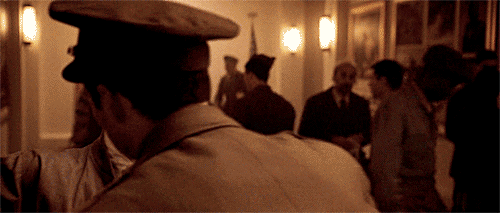
#the strain#headcanon#head canon#fandom#fandom friends#i fucking love you guys#yes every one of you regardless of past beef#。゜゜(´O`)°゜。#rant#the strain rant#the strain review#review
8 notes
·
View notes
Text
Madoka Magica isn't a deconstruction
As a subject, Mahou Shoujo is, in my opinion one of the most misunderstood and yet widely adopted genres in anime.
Being a regular fan, you can know about its presence like that of Super Robot and Battle Shounen- and yet have no insight into its role as one of the eldest genres on the scene.
Many viewers simply don't find interest in watching a feminine, almost voyeuristic take on dramatized child adolescence, which is totally fine. (Doesn't make you any less of a fan of the genre either if you’re of the male persuasion and aren't there for those themes. All power to you!)
However, when it comes to analyzing such genre steeped shows, like that of Sailor Moon or Little Witch Academia- those without the wide understanding for which their structures are based can make unfair or miscalculated conclusions of what those stories communicate.
This is the exact quandary that Madoka Magica poses for such analysis and why I don't consider it a deconstruction of the Magical Girl genre.
Mahou Shoujo, or Magical Girl is a term assumedly coined by that of Mitsuteru Yokoyama and Fujio Akatsu-ka, creators of Mahoutsukai Sally and Himitsu no Akko-chan; firsts of the genre, bench marking its creation in the early 60’s.
(I say “assumedly” as I can't find anything divulging the cut and dry fact. Hit me up if you have the actual source with citation.)
The genre has many subsets, but for the sake of your time we’re going to focus on the most popular and prolific of the Magical Girl Sub-genres, Magical warrior. There are some key components that make a show “magical warrior”.
1.) Have the protagonist or other female characters gain/have the ability to transform into an alternate, enhanced version of themselves.
2.)The presence of a magical companion, whether that be a animal or object that accompanies the protagonist in her magical endeavors.
3.)Items that assist in either the transformation process or battle for the protagonist
4.)An adversarial force threatening the lives of the protagonist, their friends, society and or existence itself
Its is of note that while a transformation is a must for this sub genre, the other factors can be all present or sparsely.
In Cardcaptor Sakura for instance the main character, Sakura Kinomoto doesn't traditionally transform but rather changes her clothes. However she still uses a magical item, is accompanied by Kero and works towards a goal that threatens the lives of those around her or her way of life.
(Arguably Sakura's “transformation” is just that because she transforms her mindset when changing outfits to better suit her magical endeavors.)
Along with those structural linchpins, Magical Warrior-centric shows are known for their glamorous, long-winded transformation sequences, teenage leads, handsome love interests, revealing outfits and normalized use of cute, bright and feminine iconography.
On the subject of how Madoka supposedly “deconstructs” these shoujo conventions common to the genre, with its “dark” tone and DEATH and despair- it simply doesn't work because modifying elements of a genre and subverting audience expectations doesn't mean your critically taking apart the framework.
But you must be asking by now “well Mirage, if twisting elements of a genre isn't Deconstruction then what is?”
Jacques Derrida was an accomplished french philosopher of the early 20th century. You can see his fingerprints all over, influencing how we study subjects embroiled in the arts and social sciences. He found that the meaning many authors and scholars claimed to see in stories were inherently arbitrary or transient.
Generally speaking, Derrida’s theory of deconstruction, (or post structuralism) deals with the mental form of which meaning takes- form. Although we perceive meaning in a text such as, let's say Evangelion or Welcome to the NHK- such meaning isn't structurally sound. A lot of deconstructive analysis focuses on the words and language we use in describing- communicating those thoughts and how they are, in their own form- failures.
Tim Nance has a fantastic video on explaining in laymen’s terms what the act of deconstruction is, I highly suggest you pop over and listen to his video. For now I will simply relay that of his points on the process of which someone deconstructs a text.
Find meaning
Identify tensions
Identify the ways that those tensions seem to be unified by meaning
Deconstructing the tension
Then unity falls apart
Then the meaning doesn't mean anything anymore.
So a Hypothetical; Hameru is chasing Kyuubei down a corridor.
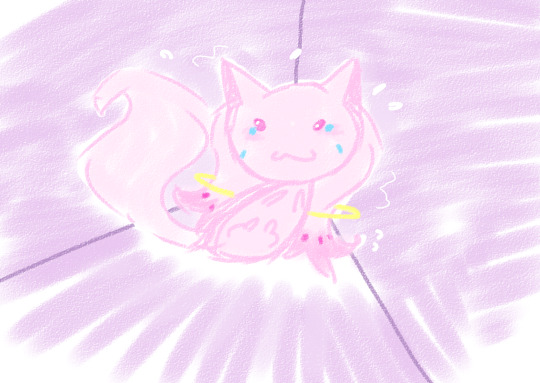
Cornering the demon rat creature, she pulls a gun from her shield.
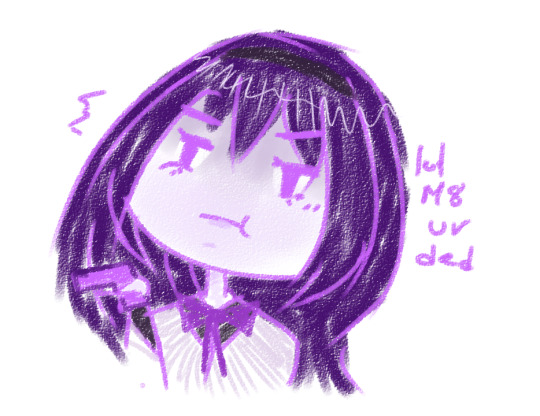
Before Homura can muster the greatest of head tilts, Kyubey yells “Homura, no matter what you do magical girls and their wishes cannot exist without the creation of witches and their curses!”
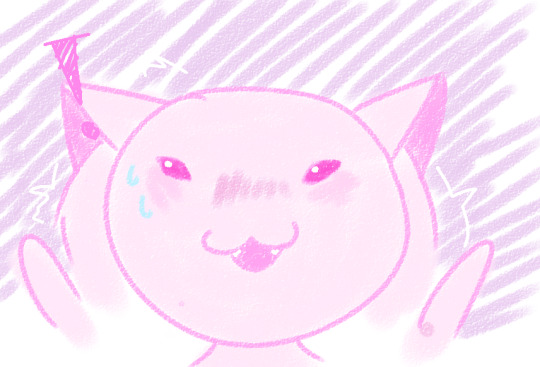
However Hameru being the dimension-skipping cynic we all know and love doubts this, arguing that “you can't know the intent of which causality occurs, Incubator. You may think that being a magical girl ultimately means being a witch but you can't know that for sure because hope is not guaranteed to falter to despair.”
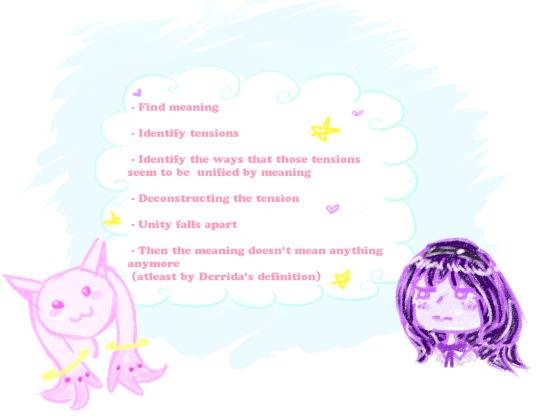
Kyubei asserts to Homura that its is impossible for witches and Magical Girls to not exist together through the Cycle of Entropy, forwarding their meaning in the knowledge perceived. Homura then identifies the tensions of such a statement, and their unity.
She understands that Kyubei believes the two to be omnipresent however questions if it's necessarily true, stating that hope doesn't necessarily need despair.
By deconstructing the tension, the structure of Kyubey’s statement falls apart and loses its meaning.
When I refer to Madoka as not being a deconstruction, its as a genre deconstruction. Instead of words, we cut down to a set of trappings and conventions that cement the subject and go about playing those elements as they would in the real world, then commenting on the genre as a whole.
While undoubtedly Madoka uses the ingredients of Mahou Shoujo, it doesn't necessarily comment on the way in which those trappings are when deconstructed. Rather it simply changes the shades of pink and white to purples and blacks.
It points out that the form the genre is known for is problematic and pushes the shape of events to a far darker place. But it doesn't take that point any further than that, focusing rather on its themes of selfishness vs selflessness.
In the case of deconstructing the genre what conversation does that start?
If it was as deconstructive as people claim, Madoka would’ve elaborated more on, lets say its themes of utilitarianism through Kyubei or Feminism regarding the witches as a whole.
Madoka has a female cast, a mascot character, transformation items and weapons, a cosmic big bad and trucks full of cute, fairytale imagery paired with its stark depictions of despair and death. It's not an outlier for its themes but rather the boundaries it's willing to push.
I think this issue is less of a problem with the show and more its fanbase. Madoka isn't deconstructive, its subversive, turning the expectations of common viewers upside down. (Again, note i’m saying subversive and not subversion.)
When ads started popping up on social media in 2011, not many people were expecting anything other than that of the “standard fair”. They were fairly innocuous, toting typical character slates and a new ClaRis song. Nobody seemed to care all that much outside of magical girl trash like myself. Then when fans of the genre saw the cool direction the show was heading as it aired, they shared it with others. Eventually a swath of anime fans Came to sing Madoka’s praises.
But as the internet is, when communities started coming together to dissect the show somebody threw the word deconstruction into the mix and now we’re here.
One thing people bring up in defense of the deconstruction argument is that Madoka features a collection of irrevocable character deaths, not recouped by the power of friendship. And while this is technically true I don't understand what makes this qualify as deconstructive. Many of the deaths in Madoka end up just as friendship fueled, and arguably less meaningful in context of the multiple universe dilemma.
For better or worse you get it; But still may be asking- what's the problem with Madoka being considered a deconstruction in the first place?
This is a rather daunting question because while it seems to be a non-issue, it affects not only the way we perceive deconstructions but that of the shows titled as such.
I want more people to get into Magical Girl-centric anime but those who label Madoka as superior to that of its predecessors stop potential fans from being created.
Believe it or not Mahou Shoujo is a much more flexible genre than it looks, capable of tackling difficult themes like that of abuse, love, identity and growing up.
Saying Madoka is contrary to the genre as a whole rather than being a darker take greatly limits what Magical girl as a concept is able to be. It harmfully obscures the shows that have celebrated and deconstructed the genre while simultaneously denouncing the messages they convey as “frivolous girly redundancy”. And that's the last thing Mahou Shoujo is.
youtube
#Madoka#Miragephan#puella magi madoka magica#mahou shoujo#analysis#anime#magical girl#deconstruction#Jacques Derrida
103 notes
·
View notes